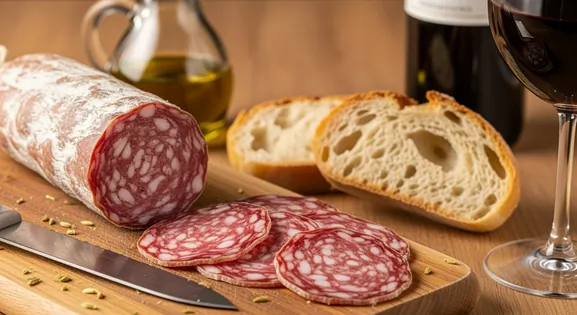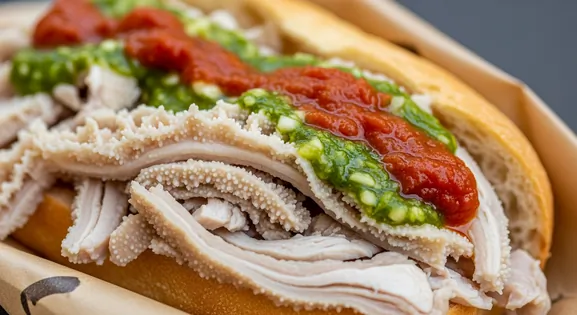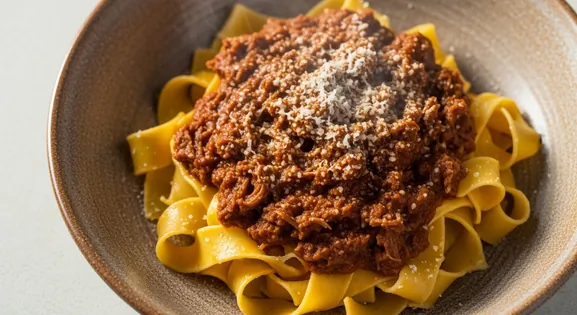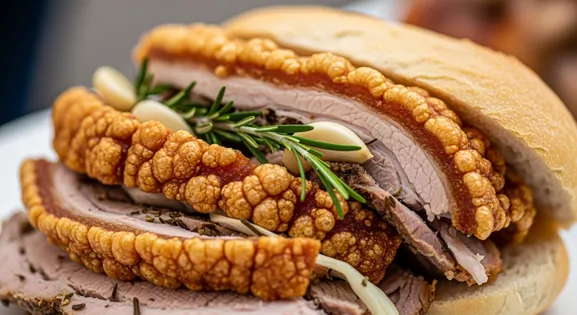Schiacciata con l'uva (Grape Flatbread) in Florence
Schiacciata con l'uva
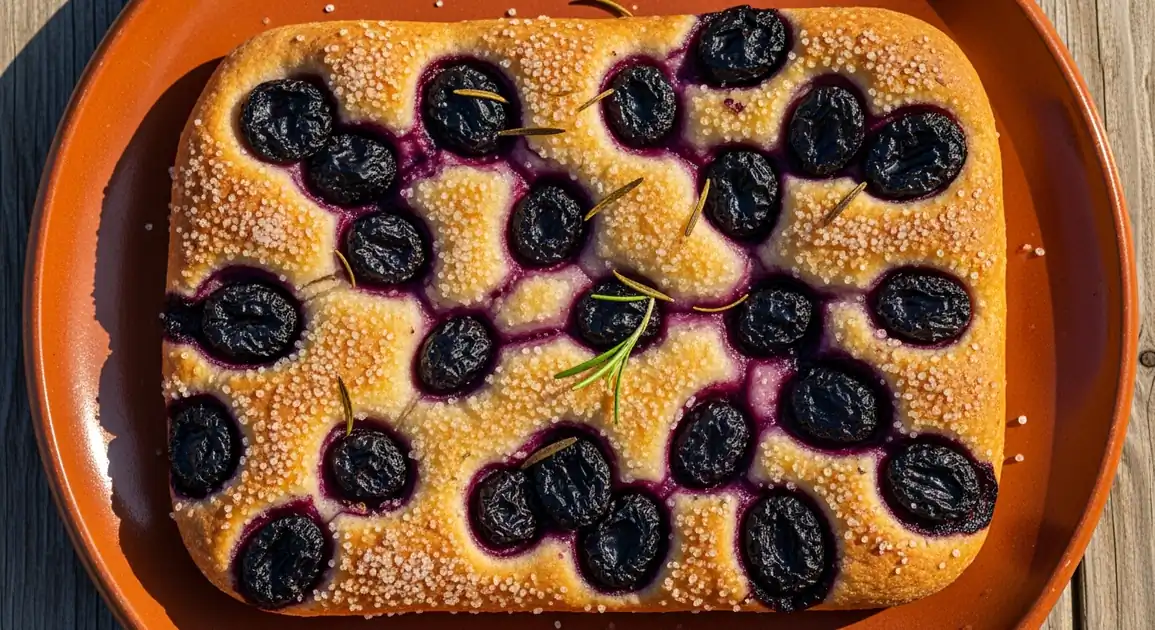
Discovering Authentic Schiacciata con l'uva (Grape Flatbread)
Stepping into a Florentine bakery in autumn, the sweet aroma of grapes and olive oil fills the air, signaling the arrival of Schiacciata con l'uva. This humble yet exquisite grape flatbread is a true taste of Tuscany's harvest season, deeply rooted in the city's culinary traditions.
New to Schiacciata con l'uva (Grape Flatbread)? Learn all about its history in our complete guide.
What the Locals Know
Explore the Oltrarno district, especially around Santo Spirito and San Frediano, for more rustic, authentic versions often frequented by locals and less tourist-priced.
The most traditional and prized Schiacciata con l'uva uses Canaiolo grapes. Ask bakeries if they use them for a truly authentic experience.
Florentines often enjoy this as a mid-afternoon snack ('merenda'). Grab a piece and find a quiet piazza to savor it like a local.
Navigating the City for Great Schiacciata con l'uva (Grape Flatbread)
Sant'Ambrogio
This authentic neighborhood near the Mercato Sant'Ambrogio has several old-school bakeries known for excellent traditional baked goods.
Mercato Sant'Ambrogio, Via Pietrapiana
Morning, Mid-afternoon
San Lorenzo / Central Market Area
Several historic bakeries around the Mercato Centrale offer traditional versions, though prices can be higher in this tourist area.
Mercato Centrale, Via dell'Ariento
Morning, Midday
Santo Spirito / San Frediano
This Oltrarno area has authentic neighborhood bakeries frequented by locals, often with excellent quality and reasonable prices.
Piazza Santo Spirito, Via di Santo Spirito
Morning, Afternoon
Gavinana / Galluzzo
These residential areas outside the historic center have family-run bakeries with more traditional, less tourist-oriented offerings.
Local piazzas, Neighborhood markets
Morning
Vendor Tips
- Look for bakeries with 'forno artigianale' or 'dal 19XX' signs, indicating traditional methods.
- Ask if they use Canaiolo grapes specifically ('Usate uve Canaiolo?'), considered the most traditional.
- If you see locals queuing, it's usually a good sign of quality and freshness.
- Request a piece from a fresh batch if possible ('È appena sfornata?').
Finding an Authentic Schiacciata con l'uva (Grape Flatbread)
What to Look For
-
Available only seasonally during the grape harvest (typically September-October) in Florentine 'forni'
Authenticity check. Year-round availability means they aren't using the correct seasonal wine grapes.
-
Made with small, dark wine grapes ('uva da vino', often Canaiolo or Sangiovese), possibly with seeds
Using table grapes results in a different, less authentic flavor and texture. Look for the characteristic small, dark grapes.
-
Visible purple/red staining where grape juice has bled into the dough
Indicates generous use of grapes and proper baking where juices infuse the bread.
-
Purchased from a reputable Florentine bakery ('forno') known for seasonal specialties
Established bakeries maintain quality standards even for seasonal items.
What to avoid
-
Schiacciata offered outside the autumn harvest season (Sept-Oct)
Almost certainly not authentic Schiacciata con l'uva made with fresh wine grapes.
-
Made with large, seedless table grapes
Incorrect ingredient, changes the flavor profile significantly from the traditional Florentine version.
-
Overly dry appearance or texture
Indicates it's old. Good Schiacciata con l'uva should retain some moisture from the grape juices.
-
Pre-packaged versions with long shelf lives found in supermarkets or tourist shops
Lacks the freshness and ephemeral quality of the bakery version; likely contains preservatives.
Know Before You Go
Dietary Information
Important Note for Travelers: Your safety is our priority. Below are the common allergens associated with the traditional preparation of this dish. However, recipes and ingredients can vary significantly between establishments. Always confirm all ingredients directly with the food vendor before ordering, especially if you have a severe allergy.
Potential Allergens
Dietary Suitability
Price Guide
Budget Tips
- Neighborhood bakeries in residential areas like Sant'Ambrogio or San Frediano offer better value (2.50-4.00 EUR per piece) than tourist-area bakeries.
- Some places sell by weight - ask for a smaller piece ('un pezzo piccolo') if you just want to taste.
- Historic central bakeries charge premium prices (5.00-7.00 EUR) for essentially the same product.
- Visit in the morning when most bakeries offer freshly made batches at regular prices.
Serving & Seasonality
In Florence, traditionally cut into rectangular pieces and served simply on bakery paper. No garnishes or accompaniments are needed, though some Florentines pair it with a small glass of Vin Santo.Best Times to Enjoy
- Morning: Many Florentine bakeries prepare fresh batches in the morning (available from 10 AM-12 PM).
- Afternoon: Traditional time for merenda (4 PM-6 PM), when some bakeries prepare a second batch.
Seasonal Availability
Available from early September (sometimes late August) through mid-October, with peak quality in mid-September during the height of the local grape harvest.
A Traveler's Guide to Ordering Schiacciata con l'uva (Grape Flatbread)
When ordering, simply ask for 'una schiacciata con l'uva' or 'un pezzo di schiacciata con l'uva'. If you want a specific size, you can gesture or ask for 'un pezzo piccolo' (a small piece) or 'un pezzo grande' (a large piece). Don't expect it outside of autumn; it's a strictly seasonal treat. Many bakeries will wrap it in simple paper for you to enjoy on the go.
Twists on a Classic
Historic Center Style
Bakeries in Florence's historic center often make slightly sweeter, thinner versions with higher sugar content, catering somewhat to tourist preferences.
Countryside Style
Bakeries in Florence's outskirts and surrounding areas often create rustic versions with more olive oil, thicker dough, and sometimes the addition of fennel seeds alongside anise.
Double Dough Version
Some Florentine bakers create a specific style with a thicker bottom layer and thinner top layer, maximizing the contrast between the crisp top and juice-soaked bottom.
Santo Spirito Style
Bakeries in this artistic neighborhood sometimes add rosemary and a hint of orange zest, creating a more aromatic version particularly popular with locals.
A Cultural Deep Dive
Local Significance
In Florence, schiacciata con l'uva represents not just harvest traditions but the city's proud artisanal baking heritage. It's seen as a strictly seasonal treat that marks autumn's arrival and connects urban dwellers to the surrounding countryside's agricultural rhythms.
Eating Customs
- Florentines often enjoy it as a mid-afternoon break, sometimes with a coffee.
- Some pair it with young cheeses like pecorino fresco for a sweet-savory contrast.
- Older Florentines may reminisce about harvest traditions while enjoying this seasonal treat.
- Buying it from your neighborhood baker ('fornaio di fiducia') is part of the tradition.
Step-by-Step Guides
Timing Your Florence Visit for Schiacciata con l'uva
Plan your trip to coincide with this delicious seasonal Florentine treat.
- Visit Florence in September or October: This is the peak grape harvest ('vendemmia') season when Schiacciata con l'uva appears in bakeries.
- Check Bakery Windows Daily: As soon as you see grapes appearing in markets, start looking for the schiacciata in 'forno' windows. Availability can vary day-to-day.
- Ask Bakeries When They Make It: Inquire 'Quando fate la schiacciata con l'uva?' (When do you make the grape schiacciata?). Some may only bake it on certain days.
- Don't Delay Buying It: If you see a fresh, good-looking batch, buy it! It's best eaten the same day, and popular bakeries can sell out.
- Look for Local Food Festivals: Sometimes small local festivals ('sagre') celebrating the grape harvest occur near Florence during this time, often featuring Schiacciata con l'uva.
Savoring Schiacciata con l'uva in Florence
Discover the best ways to enjoy this unique sweet and savory Tuscan flatbread, appreciating its seasonal flavors and local traditions.
- Eat it Fresh on the Day of Purchase: Its texture and flavor are best when fresh; it tends to dry out quickly.
- Enjoy as a Snack or Dessert: It's perfect for a mid-morning or afternoon snack ('merenda') or as a rustic dessert after a meal.
- Pair with Vin Santo (Optional): For a truly Tuscan experience, enjoy a slice with a small glass of Vin Santo, a local dessert wine.
- Appreciate the Sweet-Savory Balance: Note the interplay between the sweet bursting grapes, the sugar topping, and the savory, olive oil-rich dough – perhaps with hints of rosemary or anise.
- Notice the Seeds: Don't be alarmed by grape seeds – they are typical in the traditional version made with wine grapes. Eat around them or discreetly spit them out.
Our Commitment to Quality
At Tasteplorers, our mission is to provide the most accurate and useful travel information in the world. To achieve this, all content on this site is created through our unique editorial framework. We utilize leading AI research tools, guided by our proprietary prompts, and a multi-stage validation process. This entire system is overseen by our editorial team to ensure everything we publish meets our high standards for accuracy, cultural nuance, and practical value for travelers.
Learn more about our Editorial Process and our Mission.
Countries
Explore regions
Europe
Discover Europe's diverse culinary landscape, from Mediterranean flavors to hearty Alpine fare. Learn to navigate markets, decode menus, and eat like a local.
Latin America & Caribbean
Discover the vibrant cuisines of Latin America & the Caribbean. Our expert guide covers everything from Mexican street food to Peruvian ceviche and market tips.
Oceania
Explore Oceania's diverse food scene. Learn about Polynesian earth ovens, Fijian feasts, and the vibrant café culture of Australia and New Zealand.
Southeast Asia
Explore Southeast Asia's diverse food cultures from Thailand to Vietnam. Get expert tips on navigating spice levels, choosing quality vendors, and understanding the rich traditions of the region.
